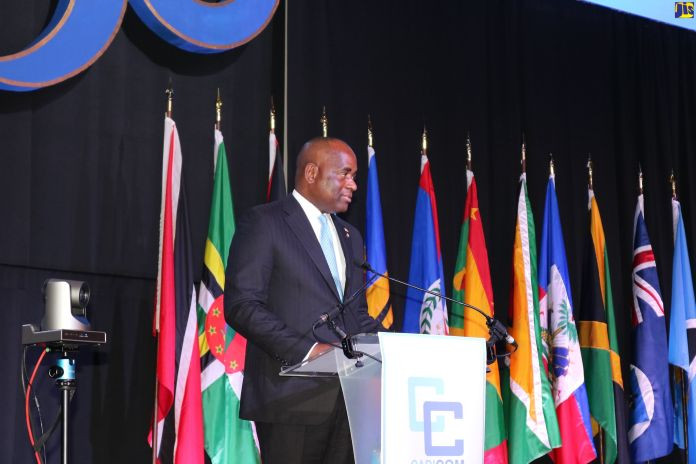By Chris Patterson
KINGSTON, Jamaica, (JIS) – Caribbean Community (CARICOM) leaders have agreed to amend the Revised Treaty of Chaguaramas by March 30, 2024, to guarantee all CARICOM nationals the right to unrestricted travel to live and work in the Member countries of the Community
Chairman of CARICOM and prime minister of Dominica, Roosevelt Skerrit, made the announcement during a press conference on July 5 to provide an update on decisions arrived at during the 45th regular meeting of the CARICOM heads of government, held in Port of Spain, Trinidad and Tobago. The free movement applies to member states that are also part of the CARICOM Single Market and Economy.
He said while the regional leaders understood that there would be challenges for some, “we are committed to this”, and noted that it is a fundamental part of the integration architecture.
“I think of all the issues we have discussed and the number of decisions that have been taken, this is the decision that we have taken at this conference, and I think the founding fathers are smiling from heaven that the present generation of leaders were bold enough,” Skerrit said.
This agreement will expand free movement beyond certain categories of skilled persons previously agreed by CARICOM governments.
Providing details on the decision, prime minister of Barbados, Mia Mottley, said the new agreement will move beyond the free movement of skills to freedom of movement of people.
Citizens of the Community will also have access to primary and emergency healthcare, education and primary, pre-primary and secondary education in each CARICOM Member State. Those rights will be added to the right to social security that exists for skilled nationals who now enjoy freedom of movement within the Community.
“There has to be a minimum set of rights guaranteed for the movement of citizens,” she explained, adding that a financing arrangement has been agreed for financing the availability of those social services in all Member States.
“We are looking at the CARICOM Development Fund as being able to put in place the mechanism to guarantee that each country brings its minimum level of services up to the same acceptable period and level,” prime minister Mottley added. The time between now and March 30 next year will be utilised to allow for governments within CARICOM to be able to implement the decision without the new regime is open to legal challenges.
“The revised Treaty of Chaguaramas, which did not exist 30 or 35 years ago, imposes certain precepts upon us that unless we carve it out, will be there to make countries liable,” prime minister Mottley explained.
The objective was to ensure that free movement within the Community takes place in a manner that is orderly, effective and that gives true expression to the aim of heads of government, while not exposing governments to any problems that they would not have otherwise anticipated because of how the Treaty is currently drafted.
The CARICOM leaders informed that the status quo would remain for Haiti, which will not be part of the free movement provisions.
“The prime minister of Haiti asked that the arrangements that we put in place for freedom of movement, that Haiti be excused from those arrangements, and we have agreed because Haiti’s circumstances are different at this point and it’s a very delicate situation. So, the status quo will remain for those countries who, in fact, still have visa requirements for Haitians,” prime minister Mottley explained. The arrangement would not apply to The Bahamas and Montserrat.
“The Bahamas and Montserrat are not a part of the CSME (CARICOM Single Market and Economy) and, therefore, they would not be subject to freedom of movement of skills or freedom of movement of people, so you have two of them out as well as Haiti that have specifically asked to be left out,” prime minister Mottley said.
“There may be one or two other countries that may have peculiar circumstances that may want to say so, but for the most part we have agreed as an integration community that we need to fuel the aspirations of our people while shouldering the responsibilities that are necessary to propel growth. We need people for growth and if we don’t have people, we’re not going to get the growth,” prime minister Mottley added.
The regional leaders also discussed the issue of security, air transportation, climate change, among others.





